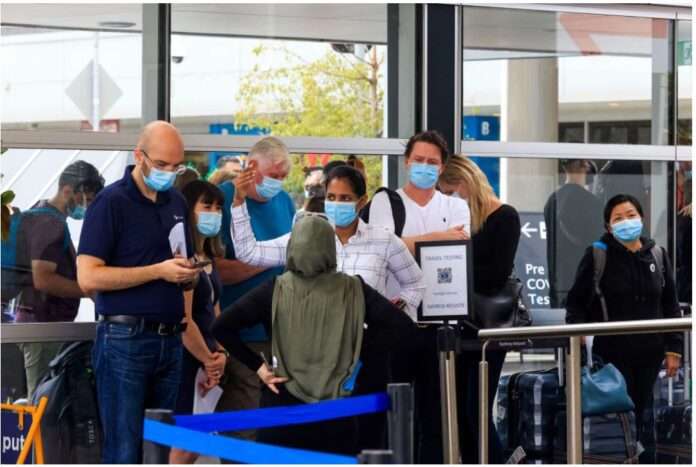COVID-19 INQUIRY: ‘Blurred Responsibilities’ Between State and Federal Governments


Eesti Eest! Newspaper delivers curated news that cut through the censorship, mainstream bias, and institutional dominance that has left society divided and misinformed. The platform allows readers to access the news that matters, particularly when it is being ignored. Updated minute-by-minute with news coverage from a diversity of publications and topics. The website may display, include, or make available third-party content (including data, information, applications, and other products, services, and/or materials) or provide links to third-party websites or services, including through third-party advertising (“Third-Party Materials”). You acknowledge and agree that Eesti Eest! is not responsible for Third-Party Materials, including their accuracy, completeness, timeliness, validity, copyright compliance, legality, decency, quality, or any other aspect thereof. Eesti Eest does not assume and will not have any liability or responsibility to you or any other person or entity for any Third-Party Materials. Third-Party Materials and links thereto are provided solely as a convenience to you, and you access and use them entirely at your own risk and subject to such third parties’ terms and conditions. This Agreement is governed by and construed in accordance with the internal laws of the State of Delaware without giving effect to any choice or conflict of law provision or rule. Any legal suit, action, or proceeding arising out of or related to this Agreement shall be instituted exclusively in the federal courts of the United States or the courts of the State of Delaware. You waive any and all objections to the exercise of jurisdiction over you by such courts and to venue in such courts. The Content and Services are based in the state of Delaware in the United States and provided for access and use only by persons located in the United States. You acknowledge that you may not be able to access all or some of the Content and Services outside of the United States and that access thereto may not be legal by certain persons or in certain countries. If you access the Content and Services from outside the United States, you are responsible for compliance with local laws. All information on this site is intended for entertainment purposes only.
Contact us: [email protected]
Eesti Eest!







The government of South Australia said responsibilities between the state and federal governments were blurred during COVID-19.
In a submission to the federal Labor government’s COVID-19 Response Inquiry, South Australia said there was a crossover on issues such as border control, vaccines, and aged care, noting there were “challenges and tension” in coordinating emergency management arrangements.
It raised a few examples.
The Commonwealth had control “over overseas arrivals, while states and territories were responsible for administering hotel quarantine schemes.”
In addition, the submission highlighted the federal government had “responsibility for vaccine regulatory approval, purchasing and supply, while states and territories became responsible for establishing mass vaccination clinics.”
Thirdly, it noted that while the Commonwealth was in charge of aged care, it relied heavily on the expertise of states and territories to provide support services during outbreaks in aged care facilities.
“Vertical fiscal imbalance embedded in Australia’s federation architecture means that even though states and territories have responsibility for emergency management, the Commonwealth has access to the greatest financial resources to respond,” the state government said.
“Future consideration could be given to whether the usual funding mechanisms, such as National Partnership Agreements, are the most appropriate vehicle for emergency responses, including consideration of timeliness and flexibility to adapt as the response progresses.”
The state government suggested these roles can be clarified and improved going forward to make sure there is better use of resources across jurisdictions.
“In particular there is a need to clarify the future arrangements in a pandemic across all areas of service delivery from acute health services, quarantine, mass vaccination and testing arrangements.”
Further, the SA government expressed there was “extreme pressure” on the health workforce at major points of the pandemic. The government said future planning must consider a response that supports the wellbeing of vital frontline and supporting staff.
The submission was supportive of National Cabinet arrangements, saying it was successful in the early phase of the pandemic.
WA, Queensland, and Tasmania Share Similar Concerns
Western Australia’s (WA) Premier Roger Cook also highlighted challenges around deciphering state and federal responsibilities during COVID-19.
“One of the key challenges during COVID-19 was the lack of clear delineation of state and territory and Commonwealth roles and responsibilities,” Mr. Cook said.
“For example, despite legislative responsibility resting with the Commonwealth, the quarantining of international and interstate travellers was left to the state and territory governments using State of Emergency powers.”
The state government’s submission also said Western Australia delivered “some of the best health and economic outcomes in Australia” by using short lockdowns, border controls and public health measures.
The Queensland government, in a largely positive submission on the pandemic response, said all jurisdictions would benefit from “clearer delineation of roles and responsibilities” in the future.
“Clear, principles-based service delivery arrangements agreed to by the Commonwealth, state and territory governments may assist in this regard.”
The Tasmanian government shared these concerns, suggesting that the Commonwealth, states and territories agree on clear roles and responsibilities before another crisis.
Couple Disagrees
Ken Bairstow and his wife, Mrs. Bairstow, claim they were “treated as criminals and demonised” when they returned to Western Australia (WA) from their annual trip to the UK in 2020.
“The room was unclean. We had no opening windows or access to fresh air. We had no change of linen for 14 days. Family supplied us with food. We were treated as criminals and demonised.”
The couple suggested quarantine services should be a Commonwealth responsibility in the future, with the government covering all costs.
Mr. and Mrs. Bairstow also suggested quarantine should only be for citizens who are infected or contagious.